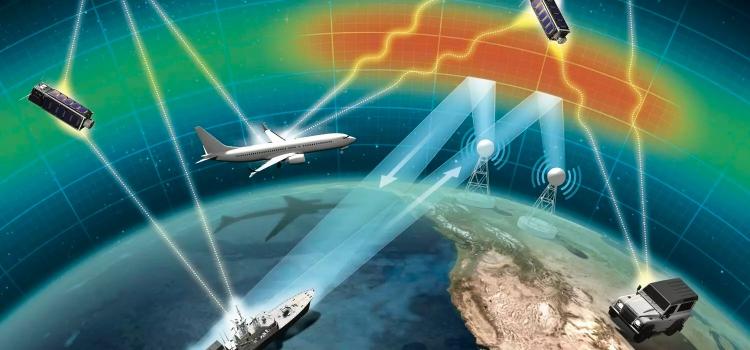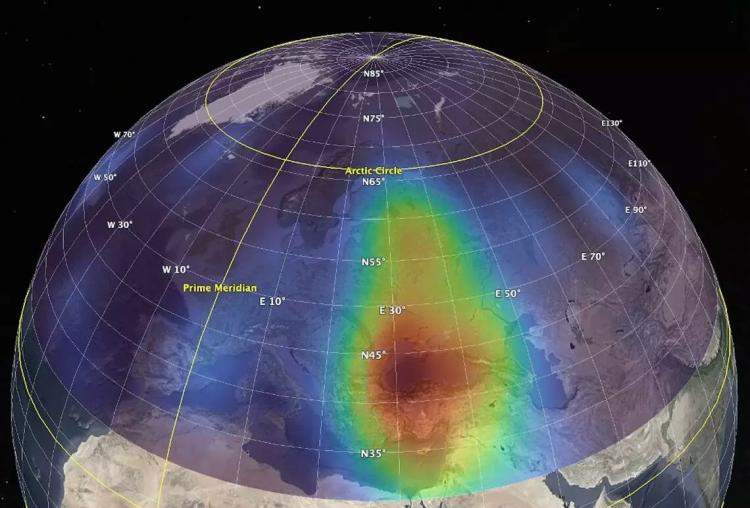A UCalgary spinoff's anti-spoofing technology is moving closer to the international market as part of the latest NATO DIANA (Defence Innovation Accelerator for the North Atlantic) innovator cohort.
The project, Quantum-Resistant Anti-Spoofing Solution for Assured Positioning, Navigation and Timing, from SDQ Solutions Canada, led by Dr. Susan Skone, PhD, was selected as one of 75 from over 2600 proposals to take part in NATO's DIANA Challenge Programme.

Image showing the different types of satellites and signals relevant to the technology created by SDQ Solutions Canada. Courtesy SDQ Solutions Canada
The DIANA Challenge is a highly competitive program that provides companies with the resources, networks and guidance to develop deep technologies to solve critical defence and security challenges. It accelerates the development of emerging and disruptive technologies across the NATO Alliance by giving companies access to mentors, capital, start-up accelerators, and end users across the alliance.
"The DIANA program offers advantage we would normally never see as a small Canadian project," says Skone, professor in the Schulich School of Engineering. "It will help us navigate the global industry. We will learn how to showcase our solutions, understand their market potential, and discover opportunities among NATO members, as well as the defence security industry and other markets."
What is anti-spoofing technology?
The technology SDQ created addresses a critical need of autonomous platforms, like unmanned vehicles and drones, that operate in challenging environments: secure positioning, navigation and timing.
Autonomous devices need reliable position information for navigation, and the operator must be sure that it's functioning as intended. Devices using satellite-based navigation signals can be vulnerable to interference with disruptive intent. Anti-spoofing technology prevents others from interfering with the information used by device and operator.
"Spoofing is done to take control of a platform," Skone explains. "If you have a drone and somebody wants to take control of its navigation and divert it from where it's headed, they may send fake signals to do that. When undetected without an override, that is where there's some danger."
While positioning and navigation technology typically employs multiple state-of-the-art sensors to mitigate the impact of intentional interference, increasingly sophisticated spoofing methods pose a threat to global satellite signals that may pass undetected until detrimental.
SDQ's quantum-resistant technology delivers a standalone solution that can detect these sophisticated attempts to disrupt satellite-based services, by offering new methods of secure signal encryption immune to quantum computing attacks.

Image produced by SDQ Solutions Canada's technology, showing hotspot detection interference activity. Courtesy SDQ Solutions Canada
The opportunity of DIANA
This technology is dual-use; it was initially designed for traditional satellite navigation systems, orbiting tens of thousands of kilometres from Earth. However, it also applies to satellites in low-earth orbit that are hundreds of kilometres from Earth and increasingly used for collecting weather data, enhancing national security, or communications systems.
It was this dual-use potential that made the technology ideal for a DIANA proposal. "Their criteria for selecting companies' civil-defence solutions are for them to be very innovative, and our technology unlike any other caught their attention," says Skone.
As part of the Data and Information Security Challenge, SDQ will join the DIANA network and be connected to mentors, end-users and the DIANA test centre network. "This will help us understand and pursue pathways of technology relevance for end users and markets," Skone says.
SDQ is a spin-off that emerged from UCalgary's Space-Defence Technologies Alberta (SDTech AB) program, a pan-Alberta initiative funded by the Government of Alberta Major Innovation Fund. SDTech AB is working to establish Alberta as a global hub for innovation in space and defence technologies central to the future global economy.
"Being part of SDTech enables us to focus on technology readiness which opens the doors for these spin-off opportunities," says Skone. "The opportunity to be part of the DIANA family, as a brand-new company, is fantastic."













